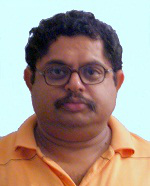Amitabha Bhattacharya was born in Kolkata, West Bengal in the year 1964. He received his B.Tech, (E&ECE) Degree from IIT Kharagpur in 1986, M.E. (E&TCE) from Jadavpur University in 1994 and Ph.D. (E. & ECE) from IIT Kharagpur in 1998.
He started his professional career in 1986 by joining as Junior Research Engineer in an ISRO- sponsored research project at IIT Kharagpur and continued thereafter as a Senior Research Assistant in a DRDO sponsored Research Project till 1991. In 1997, he joined SAMEER, Mumbai and then Defence Lab, Jodhpur as a Research Scientist. From 2000 onwards he joined teaching profession, first as an Assistant Professor in the Electronics and Instrument Department of Indian School of Mines, Dhanbad and then in 2007, in the faculty of Electronics and Electrical Communication Engineering Department of IIT Kharagpur in 2007. Presently he is working as an Associate Professor in the same Department and is involved in the teaching and research activities of the RF and Microwave Group of the E&ECE Department.
Dr. Bhattacharya‘s research interest is in the areas of Microwave Imaging, Microwave Propagation, High Power Microwaves and Microwave Stealth Technology. He has published 97 international research publications, two technical reports for Indian Defense, written a Tata McGraw Hill published text book on “Digital Communication” and co-authored a book chapter on “Modal Analysis of Reflector backed Hybrid Printed dipole antenna”. He has also developed 3 NPTEL MOOC online courses on microwave technology. He has been principal Investigator of 19 research projects and consultancies sponsored by agencies like DRDO, ISRO, Indian Army, BARC, MHRD, Wipro etc., has conducted 18 short term courses specially training scientists from HAL, ISRO, DRDO, Indian tri-services etc. in the areas of Electromagnetic Environments and Microwave Technologies. Dr. Bhattacharya has supervised six Ph.D. thesis and thirty five postgraduate theses. Presently he is supervising nine research students.

DOWNLOAD APP
FOLLOW US